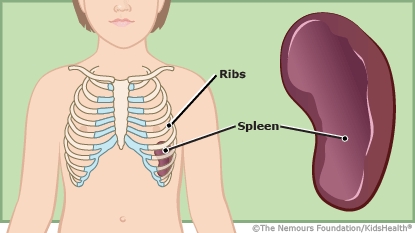Spleen Laceration: How to Care for Your Child
Your child is doing well after a spleen injury and is ready to leave the hospital.


The spleen is an organ located in the abdomen; it helps the body fight infection, control the amount of blood in circulation, and destroy damaged cells.
The spleen is the organ most often injured in a blow or "blunt trauma" to the abdomen, and can be "lacerated" (torn) or bruised. In the past, the spleen was often surgically removed after an injury. Today we know that most spleen lacerations heal without surgery. Because the spleen is so important in fighting infection, everything was done to help your child's spleen heal so it does not need to be removed.
The usual treatment is rest and limitation of physical activity. Spleen lacerations are graded on a scale from 1–5, where 1 is the least severe and 5 is the most severe. Your child may have a surface injury or a deeper tear in the spleen that needs time and rest to heal on its own. How long your child must limit activities after discharge from the hospital depends on how serious the injury was and how well the body is handling it.

-
Make sure your child carefully follows the activity guidelines from the health care team to help manage pain and prevent injuring the spleen again.
-
No sports, gym class, or physical activity until your child's trauma surgeon says it is OK.
-
Give your child acetaminophen for pain, as directed.
-
Follow up with your child's trauma surgeon, as instructed.

Your child:
-
Has pain that isn't relieved by pain medication.
-
Develops swelling or bulging of the abdomen.
-
Develops left shoulder pain.
-
Has another injury involving the abdomen while recovering from the spleen injury.
-
Has a fever above 101°F (38.3°C).

Your child:
-
Develops severe abdominal pain.
-
Looks pale and becomes very sleepy.
-
Develops dizziness or fainting.
-
Vomits blood or has blood in his/her urine (pee) or stool.
-
Appears dehydrated; signs include dizziness, drowsiness, a dry or sticky mouth, sunken eyes, producing less urine or darker than usual urine, crying with little or no tears.

It is normal for kids to feel stressed, worried, jumpy, or helpless after a serious injury like a spleen laceration. If these symptoms last longer than a few weeks, talk with your health care provider about how to help your child manage the stress of a serious injury.